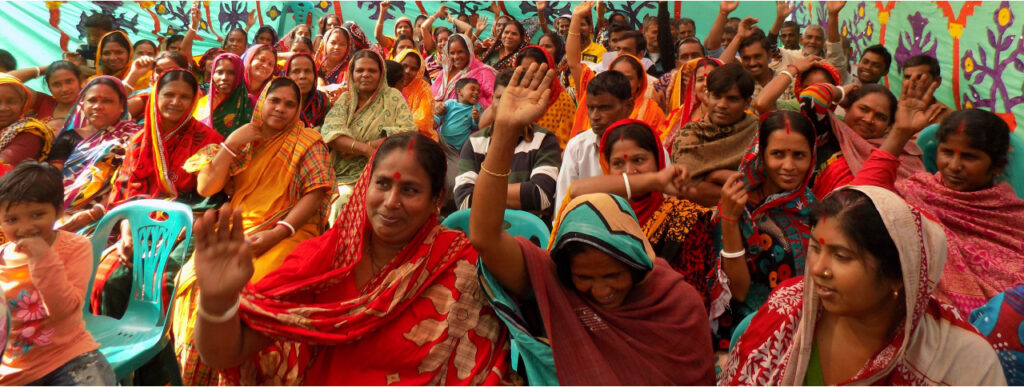COVID-19 has brought the issue of housing to the forefront as the world was instructed to shelter in place. Unfortunately, the effects of this pandemic have been disproportionately worse for women around the world and has been hard-hitting in key areas like financial stability and economic growth, health and safety, and has hindered progress in gender equality overall. Housing itself can play a key role in alleviating the damage of the current pandemic for women and needs to be considered a higher priority in recovery efforts.
The home has historically been a symbol of safety and refuge, yet approximately 1.6 billion people live in substandard housing throughout the world. In most cases, housing is looked at in a more binary fashion, either people have shelter or they are homeless–the most extreme version of inadequate housing. According to the UN, the right to adequate housing means the “right to live somewhere in security, peace, and dignity”, encompassing a much broader definition. Less often is the focus on the quality of the existing homes or on associated ownership rights. Both of these aspects of housing have extremely important effects on health, economic prosperity, safety, and well-being, especially for women.
When we think about critical tools for advancing women’s empowerment and gender equality, the right to adequate housing and ownership is not typically the first to come to mind. More often, we think of investing in health, creating more economic opportunities, and establishing physical protections as some of the necessary instruments. Adequate housing, in fact, can influence all three of these areas and the pandemic has brought its importance back into the spotlight.
COVID-19 & Impact on Women’s Health
The pandemic has both directly and indirectly worsened health outcomes for women. Directly, as they have faced higher exposure risks to the virus as more women are frontline workers in healthcare facilities, such as nurses and cleaners, and take on caretaker roles when other family members fall sick. The less direct impacts stem from the fact that resources are being reallocated to combat the virus and away from sexual and reproductive health services in many countries. These diverted resources will mean higher rates of maternal mortality and morbidity, increased rates of adolescent pregnancies, HIV and sexually transmitted diseases. These diminished health outcomes are not to be underestimated as they will have stark, long-term consequences if left unchecked. Early on in the pandemic, researchers estimated that reduced coverage of various childbirth interventions would account for approximately 60% of additional maternal deaths across 118 low-income and middle-income countries. They also estimated that reduced coverage of antibiotics and oral rehydration would together account for around 41% of additional child deaths.
To make matters worse, the current prevention measure is only available to those with access to proper housing. COVID-19 has highlighted the need for adequate shelter for health as many communities and entire nations were put on lockdown in response. Adequate housing can be used as a preventative health tool against various diseases and help stop the spread of highly infectious viruses such as COVID-19. However, for those living in substandard housing, these measures are not nearly as effective in shielding residents from exposure to infection. Many existing issues of the home environment have been magnified as a result; for example, overcrowding, lack of clean water and sanitation, improper ventilation, to name a few.
By working to improve housing conditions during this time, more frontline workers and caretakers of those who are sick will be better able to keep themselves and their families safe from infection within their own homes with better access to sanitation, less overcrowding and proper ventilation. Also, for those women who have lost sexual and reproductive health services, improving the quality of their homes will help prevent diseases that would have required the health services that are no longer available. For instance, diarrheal diseases are the second leading cause of death for children under five globally and nearly 90% of all diarrhea-associated deaths are related to inadequate sanitation. Studies have shown that improvements in the home are associated with reduced child mortality. So, investing in adequate housing will have an immediate positive impact on health outcomes for communities around the globe.
COVID-19 & Economic Effects on Women
In addition to devastating health effects, the crisis has dealt a significant blow to economic gains for women as they have suffered higher rates of job losses worldwide. Especially as entire industries such as hospitality, retail and tourism, where women are overrepresented, were brought to a halt. Women have higher levels of job insecurity already and are less likely to be working in the formal economy and less social protections as a result. In addition, the need for unpaid care work has increased as childcare and schools are closed, putting more burden on women who are more often the ones who have to balance childcare and education with their own workload.
Given this financial insecurity, the pandemic has exacerbated the need for women to have land and home ownership rights and for these rights to be enforced. To secure any form of housing, many women are dependent on others as women own less than 20% of the world’s land. Land and property ownership serve to boost economic prosperity; yet, in half of the world women are unable to access either, even when they have the legal standings to do so in some cases. As a result, women face double the barriers with the combination of unreliable employment and relying on others for housing, making it even more challenging to be financially independent or work their way out of poverty.
Housing ownership also plays a critical economic role in other ways; it can serve as collateral for business loans or a general safety net. Given that many women lack property rights, this issue only serves to further intensify existing economic inequalities between men and women. Without ownership rights, women are unable to gain access to the same credit services as men are, and are less able to recover from financial losses from the pandemic; hindering future economic potential as well.
To summarize, the virus has caused greater job losses for women compared to men, which is the very same group who already suffers from having less social protections and smaller savings. This disproportionate effect is then compounded by the fact that women also have less access to capital to better absorb losses and recover, or borrow to rebuild. With housing playing such a critical role for both health and economic security, it is imperative to secure and enforce ownership rights for women around the globe.
COVID-19 & Gender Based Violence
Furthermore, women’s safety and well-being are now at a higher risk as the corresponding lockdown measures have intensified domestic and gender-based violence globally. A UNFPA study estimated that the pandemic will cause a one-third reduction in progress towards ending gender-based violence by 2030. To make matters worse, the UN estimated that 2 million cases of female genital mutilation and 13 million child marriages will occur that could have otherwise been prevented.
There is an inherent relationship between gender-based violence and the right to adequate housing for women. If women do not have the same rights to own land and property as their male counterparts or have the same economic stability, this immediately puts them in a more vulnerable position, especially given the stay-at-home orders that used to curb the pandemic. Without independent rights, many women are at the mercy of their spouse or in-laws for shelter and are even more defenseless if they are among any of the following groups: widows, divorced or separated, unmarried with children, indigenous and tribal women, girls, elderly, women with disabilities, migrant women, domestic workers, and lesbian, bisexual and transsexual women.
Lack of adequate housing during the lockdowns has increasingly put women at risk of physical harm. Without the financial independence or legal rights to own land or property, many women are forced to remain in dangerous situations. Various studies have shown that providing property and land ownership rights for women have actually reduced rates of domestic violence more so than increased education or employment. Land and property ownership give women greater bargaining power and a voice in house-hold decision making, also helping to deter spousal violence.
CONCLUSION
At this point, the effects of the pandemic are severe and wide-reaching, and the faster we respond, the better chances we will have at reversing some of the harm done to women and girls worldwide. By not prioritizing adequate housing as a right, we are failing to give women preventative health measures for them and their children, access to capital and economic security, and a physical shelter that is not dependent on others.
Now, more than ever, as there is an increased focus on time spent in the home, it is critical that we work to ensure that everyone has adequate and safe shelter with legal protections for ownership. A key policy intervention would be to prioritize expanding the right to adequate housing for women globally and effectively enforcing the policy so that women are not then stigmatized or penalized for exercising their right. This will require a shift in cultural behaviors for some communities, but as COVID-19 has made abundantly clear, adequate housing is necessary for every person worldwide; for their health, economic security, safety and well-being.
We should be pushing to secure the right to adequate housing for women and men to have a significant impact on 1) improving health outcomes by preventing and reducing the burden of disease, 2) boosting economic prosperity by serving as a financial asset and safety net, and 3) providing physical protection and shelter so that increased time spent at home does not further endanger the health and safety of women and their families. Doing so will not only improve the lives of the most vulnerable people around the world but also make meaningful progress on women’s empowerment and gender equality.

